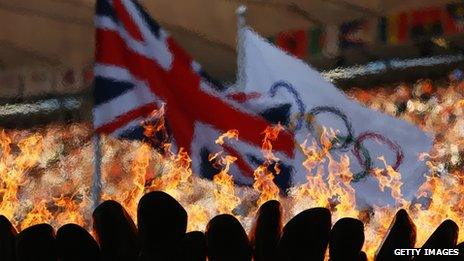Brand GB – a good games
- Published
- comments

Ask foreigners to describe Britain and they will often reflect on a people obsessed with their past and resigned to their fate. We have a reputation for reserved introspection.
The Diamond Jubilee presented a familiar British face to a watching world - street parties and formal ceremonial held, as might be seen as traditional, in the rain.
It was "red and gilt Britain", as one US journalist based here described it to me. And we are very good at it.
The expectation was that the Olympics would be conducted within the same colour palette. A London games, it was widely assumed, would resound to the echoes of past glories - a retrospective of an ancient island people.
But almost from the moment the clang of a giant golden bell announced the opening ceremony, it was clear that stereotypes were being challenged. The history was there. So was the Queen. But the tone was optimistic and self-deprecating - a portrait of a country aware of its shortcomings but surprisingly confident about its future.
And the games began - draped in dazzling pink and purple, orange and poppy-red. It was an audacious statement. London 2012 would be determinedly contemporary.
For a moment the country held its breath. We had been warned to expect travel chaos, security meltdown and organisational incompetence. When a coach driver got lost bringing athletes to the Olympic Park, it seemed as though Britain was lining up for at least a bronze in bungling.
But it didn't happen. In fact, the teams of pandemonium correspondents assigned around the capital were forced to kick their heels or quickly develop an understanding of the finer points of dressage and rhythmic gymnastics.
Let's be clear. Putting on an Olympics is a massively complex task - what is known in the jargon as a "mega-project". It requires collaboration and planning on a breath-taking scale. And just one oversight or error has the capacity to destroy a host city's reputation and damage a country's image.
What we have seen over the past fortnight is an amazing success story. Far from exposing mediocrity and incompetence, the games have challenged lazy assumptions about what kind of country we are - not just to foreigners but to ourselves.
Each time we look at the medal table, we are encouraged to believe that we still have the capacity to punch above our weight in the world. Each time the TV cameras swoop over the smiling crowds in the Olympic venues, we are reminded that we can match anyone when it comes to putting on a show.
There is a danger of becoming giddy, like a love-struck teenager who assumes too much from a fortnight of summer adventure. The sugar-rush of sweet success is likely to be swiftly followed by the sickener of remembering just what economic and social challenges lie ahead for this country.
But let's not forget what some people predicted would happen: an embarrassing and chaotic two weeks during which all the flaws of our declining nation would be exposed.
Brand GB would have been horribly undermined and this country's reputation and prospects damaged for decades.
As it is, we have presented ourselves as competent, successful, confident and fun. To paraphrase Brucie - it's been a good games, my love, good games.